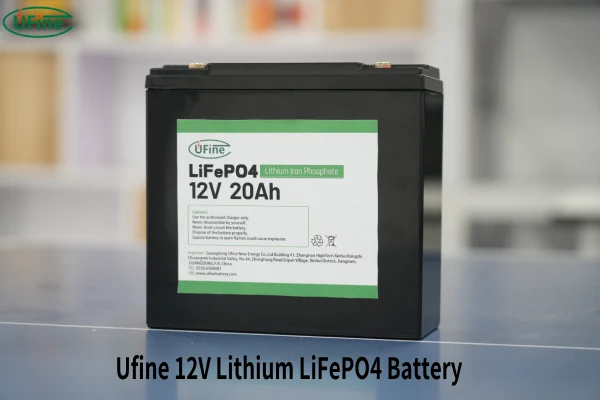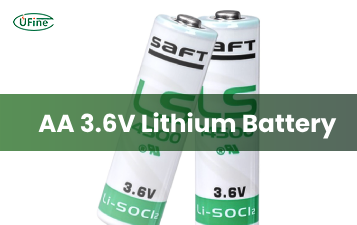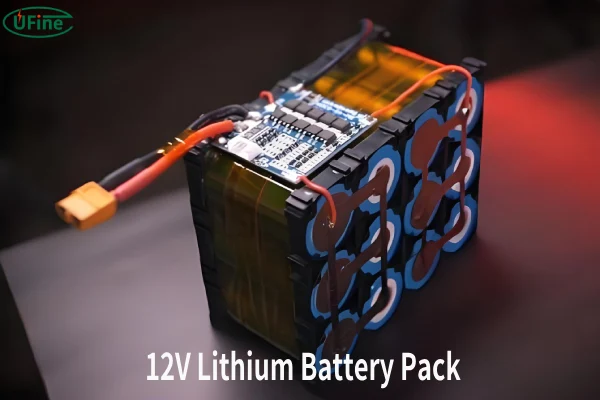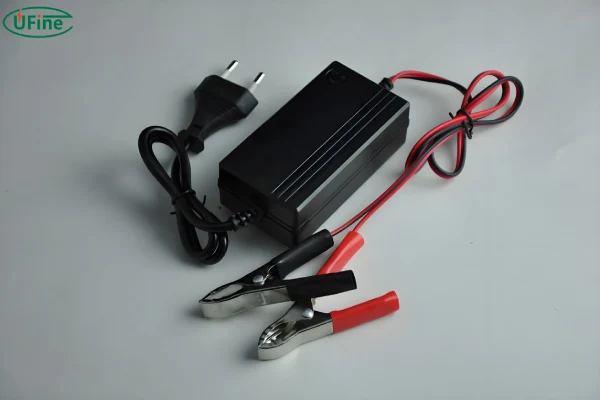Part 1. What is 12v lithium battery?

A 12V lithium battery is a type of rechargeable battery that utilizes lithium-ion chemistry to store and release energy. It’s designed to provide a nominal voltage of 12 volts, making it compatible with many devices and systems that traditionally rely on lead-acid batteries. However, unlike lead-acid batteries, 12V lithium batteries offer several significant advantages, making them a superior choice for many modern applications.
Delving into the Chemistry: The Heart of the Battery’s Power
The heart of a 12V lithium battery lies in its lithium-ion chemistry. This chemistry involves the movement of lithium ions between the anode (negative electrode) and cathode (positive electrode) to store and release energy. The anode is typically made of graphite, a material known for its ability to store lithium ions efficiently. The cathode, on the other hand, can be made from various materials, each with its own characteristics influencing the battery’s performance. Common cathode materials include:
- Lithium Cobalt Oxide (LCO): LCO cathodes are known for their high energy density, meaning they can store a significant amount of energy in a small space. However, they have a limited lifespan and can be susceptible to overheating.
- Lithium Manganese Oxide (LMO): LMO cathodes offer good safety and thermal stability, making them a reliable choice for applications where safety is paramount. However, they have a lower energy density compared to LCO cathodes.
- Lithium Nickel Manganese Cobalt Oxide (NMC): NMC cathodes provide a balanced combination of energy density, power, and lifespan. They are a popular choice for electric vehicles and energy storage systems, where a balance of these factors is crucial.
Unpacking the Structure: Components Working in Harmony
The structure of a 12V lithium battery is carefully designed to facilitate the flow of lithium ions and ensure safe and efficient operation. Key components include:
- Separator: A thin, porous membrane that separates the anode and cathode, preventing them from coming into direct contact. This separation is crucial to prevent short circuits and ensure safe operation.
- Electrolyte: A liquid or gel that allows lithium ions to move freely between the anode and cathode. The electrolyte plays a vital role in facilitating the chemical reactions that store and release energy.
- Case: A protective case that encloses all the battery components. The case provides structural support, protects the internal components from damage, and helps to prevent the release of harmful gases.
Understanding the Principle: The Dance of Lithium Ions
The principle behind a 12V lithium battery is based on the movement of lithium ions between the anode and cathode. During charging, an external power source forces lithium ions to move from the cathode to the anode, storing energy within the battery. During discharge, the stored energy is released as lithium ions move back from the anode to the cathode, powering the connected device. This continuous movement of lithium ions is what allows 12V lithium batteries to store and release energy efficiently.
Part 2. Advantages and disadvantages
Pros
12V lithium batteries offer a compelling set of advantages over traditional lead-acid batteries, making them a preferred choice for many modern applications. These advantages include:
- High Energy Density: 12V lithium batteries boast a significantly higher energy density compared to lead-acid batteries, meaning they can store more energy in a smaller space. This makes them ideal for applications where space is limited, such as in electric vehicles or portable power stations.
- Long Lifespan: Lithium-ion batteries are renowned for their long lifespan, capable of withstanding numerous charge-discharge cycles without significant degradation. This translates to a longer service life, reducing the need for frequent replacements and minimizing maintenance costs.
- Lightweight: 12V lithium batteries are significantly lighter than lead-acid batteries with the same capacity. This weight advantage is particularly beneficial in applications where portability is crucial, such as in golf carts, electric bikes, and portable power systems.
- Fast Charging: 12V lithium batteries can charge much faster than lead-acid batteries, reducing downtime and increasing convenience. This is especially valuable in applications where quick recharging is essential, such as in electric vehicles or emergency power systems.
- Low Maintenance: 12V lithium batteries require minimal maintenance compared to lead-acid batteries, which often need regular topping up with water. This low-maintenance nature reduces the effort and cost associated with battery upkeep.
- Environmentally Friendly: 12V lithium batteries are more environmentally friendly than lead-acid batteries, as they do not contain hazardous materials like lead. This makes them a more sustainable choice for the environment.
Cons
While 12V lithium batteries offer numerous advantages, it’s essential to acknowledge their potential drawbacks:
- Cost: 12V lithium batteries are generally more expensive than lead-acid batteries, especially for larger capacities. This cost difference can be a significant factor for budget-conscious users.
- Sensitivity to Temperature: Lithium-ion batteries can be sensitive to extreme temperatures, which can affect their performance and lifespan. Exposure to high temperatures can accelerate battery degradation, while exposure to very low temperatures can reduce battery capacity and charging efficiency.
- Safety Concerns: Lithium-ion batteries can be a fire hazard if not handled properly. They should be stored and used in accordance with manufacturer instructions to prevent overheating, overcharging, or short circuits.
Part 3. How long does a 12V lithium battery last?
The lifespan of a 12V lithium battery is influenced by several factors, including:
- Battery Capacity: Higher capacity batteries generally have a longer lifespan, as they experience less stress during each charge-discharge cycle.
- Usage Patterns: Frequent deep discharges, where the battery is drained to a very low level, can shorten the battery’s lifespan. It’s generally recommended to avoid deep discharges whenever possible.
- Charging Habits: Using a proper charger designed for lithium-ion batteries and avoiding overcharging can extend the battery’s lifespan. Overcharging can damage the battery and reduce its capacity over time.
- Operating Temperature: Extreme temperatures can accelerate battery degradation. Storing and using the battery within its recommended temperature range can help to prolong its lifespan.
With proper care and maintenance, a 12V lithium battery can typically last for 5 to 10 years. However, the actual lifespan can vary depending on the factors mentioned above.
Part 4. Applications
12V lithium batteries are becoming increasingly popular in a wide range of applications, thanks to their versatility and high performance. Some of the most common applications include:
- Electric Vehicles: 12V lithium batteries are used in electric vehicles to power the auxiliary systems, such as lights, wipers, and radio. Their high energy density and lightweight design make them ideal for these applications.
- Golf Carts: 12V lithium batteries are rapidly replacing lead-acid batteries in golf carts, offering longer runtime, lighter weight, and faster charging. These benefits enhance the overall golf cart experience.
- Electric Bikes: 12V lithium batteries are used in electric bikes to provide assistance during pedaling, extending the rider’s range and making cycling more enjoyable.
- Solar Energy Systems: 12V lithium batteries are used in off-grid solar energy systems to store energy generated by solar panels, providing a reliable source of power even when the sun isn’t shining.
- Backup Power Supplies: 12V lithium batteries can provide backup power during outages, ensuring uninterrupted operation of essential devices, such as computers, refrigerators, and medical equipment.
- Marine Applications: 12V lithium batteries are used in marine applications, such as powering boat engines, navigation systems, and other onboard electronics. Their resistance to corrosion and vibration makes them well-suited for these demanding environments.
Part 5. Key parameters to consider when choosing a 12V lithium battery
When choosing a 12V lithium battery, it’s essential to consider several key parameters to ensure that you select the right battery for your specific needs:
- Capacity (Ah): The capacity of a battery, measured in Amp-hours (Ah), determines how much energy it can store. Higher capacity batteries provide longer runtime, making them suitable for applications that require extended operation.
- Discharge Rate (C Rate): The discharge rate, expressed as a multiple of the battery’s capacity (C), indicates how quickly a battery can deliver energy. Higher discharge rates are suitable for applications that require high power output, such as electric vehicles or power tools.
- Cycle Life: The cycle life of a battery refers to the number of charge-discharge cycles it can withstand before its capacity significantly degrades. Batteries with higher cycle life are more durable and can last longer.
- Internal Resistance: Lower internal resistance leads to better performance and less heat generation. Batteries with lower internal resistance are more efficient and can deliver more power without overheating.
- Operating Temperature Range: The operating temperature range of a battery determines the temperatures at which it can safely operate. It’s crucial to choose a battery that can operate within the temperature range of your application.
- Safety Features: Safety features, such as overcharge protection, over-discharge protection, and short-circuit protection, are essential for ensuring safe operation. These features help to prevent damage to the battery and minimize the risk of fire or other hazards.
- Dimensions: The dimensions of a battery are important for ensuring compatibility with the device it will be used in. Make sure to choose a battery that fits the available space.
- Weight: The weight of a battery is an important consideration for portable applications, such as electric bikes or portable power stations. Lighter batteries are easier to handle and transport.
Part 6. 12V lithium battery charger
A 12V lithium battery charger is a device that supplies a controlled current to charge a 12V lithium battery. It’s essential to use a charger specifically designed for lithium-ion batteries, as using a charger designed for lead-acid batteries can damage the lithium battery. A proper charger will ensure that the battery is charged safely and efficiently, maximizing its lifespan and performance.
Part 7. 12V lithium battery manufacturer
Ufine Battery is a leading Chinese lithium battery manufacturer specializing in customizing lithium-ion batteries, lithium polymer batteries, 18650 batteries, LiFePO4 batteries, high temperature batteries, low temperature batteries, etc. They offer a wide range of battery sizes, capacities, and voltages to meet the diverse needs of their customers. When choosing a 12V lithium battery manufacturer, it’s important to select a reputable company with a proven track record of quality and reliability.
Part 8. Conclusion
12V lithium batteries have emerged as a powerful and versatile energy source, offering numerous advantages over traditional lead-acid batteries. By understanding their features, advantages, and key parameters, you can choose the right 12V lithium battery for your specific needs. Whether you’re powering an electric vehicle, a golf cart, or a solar energy system, 12V lithium batteries offer a high-performance solution that can meet your energy demands and enhance your experience.
Related Tags:
More Articles

What You Need to Know About AA 3.6V Lithium Battery
Learn all about AA 3.6V lithium batteries—voltage, size, capacity, uses, and the best replacements. Discover why they’re powerful, and highly reliable.
What Are Lithium Salts and Why They Matter in Battery Electrolytes
Lithium salts in electrolytes are key to battery performance, powering everything from phones to EVs and shaping the future of clean energy.
Lithium AAA Battery Guide: Power, Performance & Chargers
Explore lithium AAA batteries—voltage, capacity, weight, top brands, and more. Learn how to choose the best battery for your device and why it really matters.
How to Calculate Watts, Volts, and Amps (With Simple Formulas and Examples)
Learn how to calculate watts, volts, and amps for lithium batteries with simple formulas and examples, ideal for EVs, solar, and energy systems.
Comprehensive Analysis of U.S. Tariffs on Chinese Lithium Batteries
U.S. tariffs on Chinese lithium batteries in 2025 impact costs, supply chains, and EV, energy storage, and electronics industries globally.





